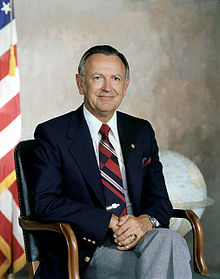Christopher C. Kraft Jr. | |
|---|---|
 Kraft as director of Johnson Space Center in 1979 | |
| Born | Christopher Columbus Kraft Jr. February 28, 1924 Phoebus, Virginia, U.S. |
| Died | July 22, 2019 (aged 95) Houston, Texas, U.S. |
| Alma mater | Virginia Tech (BS) |
| Occupation(s) | NASA flight director Director of Johnson Space Center |
| Spouse |
Betty Anne Kraft (m. 1950) |
| Children | 2 |
| Awards |
|
Christopher Columbus Kraft Jr. (February 28, 1924 – July 22, 2019) was an American aerospace and NASA engineer who was instrumental in establishing the agency's Mission Control Center and shaping its organization and culture. His protégé Glynn Lunney said in 1998: "the Control Center today ... is a reflection of Chris Kraft".[1]
Following his 1944 graduation from Virginia Polytechnic Institute and State University with a degree in aeronautical engineering, Kraft was hired by the National Advisory Committee for Aeronautics (NACA), the predecessor organization to the National Aeronautics and Space Administration (NASA). He worked for over a decade in aeronautical research and in 1958 joined the Space Task Group, a small team entrusted with the responsibility of putting America's first man in space. Assigned to the flight operations division, Kraft became NASA's first flight director. He was on duty during America's first crewed spaceflight, first crewed orbital flight, and first spacewalk. At the beginning of the Apollo program, Kraft retired as a flight director to concentrate on management and mission planning. In 1972, he became director of the Manned Spacecraft Center (later Johnson Space Center), following his mentor Robert R. Gilruth, and held the position until his retirement in 1982.
Later, Kraft consulted for companies such as IBM and Rockwell International. In 1994, he was appointed chairman of a panel to make NASA's Space Shuttle program more cost effective. The panel's controversial report, known as the Kraft report, recommended that NASA's Space Shuttle operations should be outsourced to a private contractor. It also recommended that NASA cut back on the organizational changes intended to improve safety that were made after the Space Shuttle Challenger disaster. This attracted even more critical comment after the Space Shuttle Columbia disaster.
Kraft published his autobiography Flight: My Life in Mission Control in 2001. The Mission Control Center building was named after him in 2011. When he received the National Space Trophy from the Rotary Club in 1999, the organization described him as "a driving force in the U.S. human space flight program from its beginnings to the Space Shuttle era, a man whose accomplishments have become legendary".[2]
- ^ Lunney, Glynn (March 9, 1998). "Oral History Transcript" (PDF). Johnson Space Center Oral History Project (Interview). Interviewed by Neal, Roy. Houston, Texas: NASA. p. 23. Retrieved February 4, 2022.
- ^ Nystrom, Lynn (April 26, 2002). "Kraft selected 2002 Ruffner Medal recipient" (PDF). Virginia Spectrum. Vol. 24, no. 31. Virginia Tech. Retrieved February 1, 2022.